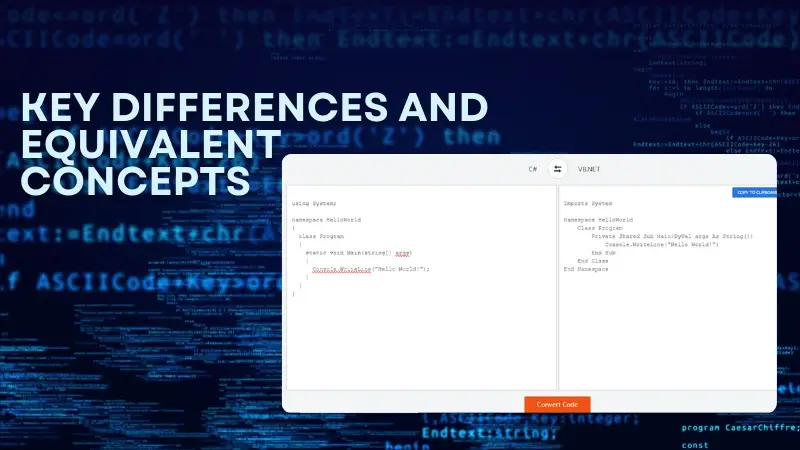 By Admin
By Admin Programming Prowess C# vs Java – What sets them apart?
Introduction
In the dynamic realm of software development, choosing the right programming language can make all the difference. Two giants that have consistently dominated the scene are C# and Java. Both languages boast impressive capabilities, but they have distinct features that set them apart. In this blog post, we’ll delve into the nuances of C# and Java, exploring what makes each language unique and discussing scenarios where one might shine brighter than the other.
C# Development: The Microsoft Marvel
Let’s kick things off with C#. Developed by Microsoft, C# (pronounced C-sharp) is a versatile and modern programming language primarily used for building Windows applications, web applications, and games. Its syntax is intuitive, making it an excellent choice for developers looking to write clean and readable code.
C# Application Development: Where Elegance Meets Functionality
C# truly shines in the realm of application development, making it a top choice for developers looking to create powerful software solutions. Whether you’re engaged in crafting desktop applications or building robust web services, C# provides a seamless and efficient development experience. The language’s integration with the .NET framework further enhances its capabilities, empowering developers to build scalable and high-performance applications.
A standout feature of C# that sets it apart in the world of application development is its robust support for asynchronous programming. In an era where the demand for responsive and efficient applications is paramount, C#’s asynchronous capabilities position it as a front-runner for developers striving to create smooth and responsive user experiences. By seamlessly incorporating asynchronous programming into the development process, C# enables developers to efficiently handle concurrent tasks, improving the overall performance and responsiveness of their applications.
In summary, C# Application Development offers a comprehensive and powerful environment for creating a wide range of applications, leveraging its seamless integration with the .NET framework and robust support for asynchronous programming to meet the evolving needs of modern software development.
Java: The Battle-Tested Workhorse
On the other side of the spectrum, we have Java – a programming language renowned for its portability and robustness. Originally developed by Sun Microsystems, Java’s “write once, run anywhere” mantra has made it a stalwart in enterprise applications and mobile development.
Hire Java Developers: Tapping into Experience
When it comes to building large-scale enterprise applications, Java has long been the go-to choice. Its ability to handle complex tasks and run on various platforms has earned it a reputation as a workhorse. The vast ecosystem of libraries and frameworks available for Java simplifies development and accelerates the delivery of projects.
For businesses seeking to hire Java developers, the abundance of experienced professionals in the market makes it a strategic move. Java developers bring a wealth of knowledge in developing robust and scalable applications, making them invaluable assets for projects with demanding requirements.
Comparative Analysis: C# vs Java
Now that we’ve taken a glimpse into the strengths of each language, let’s delve into a comparative analysis to better understand where C# and Java shine.
Performance:
In terms of raw performance, both languages hold their ground admirably. However, when it comes to specific scenarios like gaming or applications that demand low-level access to hardware, C# with its integration with the Unity game engine often takes the lead.
Platform Independence:
Java’s promise of platform independence has been a game-changer for businesses seeking to deploy applications across various operating systems. C#, while traditionally associated with Windows development, has made strides in becoming cross-platform with the advent of .NET Core and the more recent .NET 5.
Community and Ecosystem:
Java boasts a vast and mature ecosystem with a multitude of libraries, frameworks, and tools. The community support for Java is unparalleled, making it an excellent choice for developers seeking answers and solutions to challenges they may encounter.
C#, although not as ancient as Java, has seen substantial growth in its community and ecosystem. The introduction of .NET Core has played a pivotal role in expanding the reach of C# beyond the Windows environment.
Conclusion: Choosing the Right Tool for the Job
In the battle between C# and Java, there is no clear winner – it ultimately depends on the specific requirements of your project. If you’re developing a Windows-centric application with a focus on responsiveness and sleek user interfaces, C# might be the perfect fit. In fact, engaging a proficient C# Development company could further enhance your project’s success by leveraging the language’s strengths.
On the other hand, if you’re working on a large-scale enterprise project that demands portability and a vast ecosystem, Java could be your best ally. Deciding between these two programming powerhouses requires a careful evaluation of your project’s unique needs and the strengths each language brings to the table. Whether you opt for the elegance of C# or the battle-tested reliability of Java, both languages offer a robust foundation for turning your programming visions into reality.
Consider consulting with a reputable C# Development company to ensure your project is in capable hands and benefits from the expertise of professionals specializing in C# application development.
Tags: c sharp web development company, c# application development company, C# development company, c# development services, c# software development company, hire java developer, hire javascript expert
Latest Resources
Key Benefits of React Native App Development
January 7, 2025
Leveraging AI in Startup Software Development: Trends and Tips
December 30, 2024
Mobile Optimization for Shopify Apps: Best Practices
December 23, 2024
Leveraging ARKit: Transforming Augmented Reality for iOS Apps
December 6, 2024
Custom vs. Template Websites: What’s Best for Your Business?
December 3, 2024

















 Services
Services

